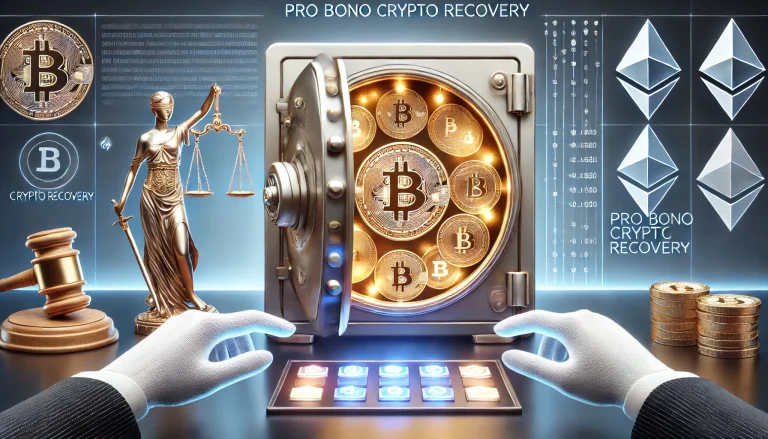Navigating the Minefield: A Realistic Look at “Free Crypto Recovery Expert Services“
Free Crypto Recovery Expert Services: Losing access to cryptocurrency funds is a gut-wrenching experience. Whether it’s due to a forgotten password, a compromised exchange account, a sophisticated phishing attack, or a misplaced hardware wallet, the feeling of helplessness can be overwhelming. In this state of panic, a quick online search for solutions often leads to a proliferation of websites and forums advertising “Free Crypto Recovery Expert Services.”
While the promise of recovering lost assets at no upfront cost is incredibly appealing, it is crucial to approach these offers with extreme caution. The world of crypto recovery is, unfortunately, a landscape where scammers prey on the vulnerable. This article will separate fact from fiction and provide a clear-eyed view of what legitimate recovery assistance looks like.
Understanding the “Free” Model: How It (Legitimately) Works
First, it’s important to acknowledge that legitimate crypto recovery services do not typically operate on a purely “free” model. Recovering lost crypto is a highly specialized, time-intensive, and technologically complex process that requires expertise in blockchain forensics, cybersecurity, and code exploitation.
The business model for most ethical recovery firms is contingency-based. This means:
-
No Recovery, No Fee: You pay absolutely nothing if they are unsuccessful in recovering your funds.
-
Success-Based Fee: Upon successfully recovering and returning your assets to you, they retain a pre-agreed percentage of the recovered amount (e.g., 10-20%).
In this context, the service is “free” to you unless it produces a successful outcome, aligning the recovery firm’s incentives with your own. This is a standard and transparent model used in other fields like law (contingency fees) and debt collection.
The Hallmarks of a Legitimate Recovery Service
How can you distinguish a credible service from a scam? Look for these key indicators:
-
Transparent Fee Structure: They are upfront about their contingency model. They will clearly explain their fees only apply upon success.
-
No Requests for Private Keys or Seed Phrases: This is the most critical red flag. A legitimate expert will NEVER ask for your private keys, seed phrases, or passwords. They do not need this information to attempt recovery. Anyone who asks for this is attempting to steal your remaining funds.
-
Professional Communication: They operate through a legitimate business entity, have a professional website, and use official email channels. They don’t exclusively operate through Telegram, WhatsApp, or Discord DMs.
-
Realistic Assessments: They will provide a realistic, no-obligation assessment of your case. They will be honest about the likelihood of success and will not make grandiose, 100% guaranteed promises.
-
Clear Process Explanation: They can explain, in general terms, the technical approach they might take (e.g., using brute-force techniques on an encrypted wallet, blockchain analysis to trace funds, or exploiting a smart contract bug).
Major Red Flags: How to Spot a Recovery Scam
Scammers are sophisticated and know how to exploit desperation. Be immediately wary of any service that:
-
Demands Upfront Payment: Any request for payment before any work is done is a clear scam. They may call it a “retainer,” “software fee,” or “processing cost.”
-
Guarantees Success: No one can guarantee the recovery of crypto. This is a promise only a scammer would make.
-
Pressures You to Act Quickly: They use high-pressure tactics, claiming the offer is “limited time” or that your funds will be lost forever if you don’t act now.
-
Requests Access to Your Computer: Be extremely cautious of anyone asking for remote access to your device under the guise of “diagnostics.”
-
Has No Verifiable Track Record: They cannot provide testimonials (that can be independently verified) or details of past successful recoveries.
-
Claims to Have “Special Relationships” with Exchanges or Miners: This is a common lie used to create a false sense of authority.
What To Do If You’ve Lost Crypto
Before engaging any third-party service, exhaust all free and self-help options:
-
Double-Check Everything: Revisit all your backups, password managers, and old hard drives. Often, the solution is something you’ve overlooked.
-
Contact the Official Source: If the issue is with an exchange (e.g., Coinbase, Binance) or a hardware wallet (e.g., Ledger, Trezor), contact their official support first. They may have procedures to help.
-
Report the Theft: If you’ve been scammed or hacked, report the incident to your local law enforcement and relevant cybercrime units (e.g., FBI IC3 in the US). While they may not recover your funds, it helps build a case and track criminal activity.
-
Do Your Research: If you decide to engage a third-party firm, research them extensively. Look for independent reviews, check their presence on platforms like LinkedIn, and see if they are mentioned in reputable crypto news outlets.
Conclusion: Tread Carefully and Manage Expectations
The phrase “Free Crypto Recovery Expert Services” is often a bait used by malicious actors. While the contingency-fee model effectively makes the service risk-free for the victim, it is not “free” in the absolute sense.

The Critical Role of Crypto Asset Recovery Experts
Free Crypto Recovery Expert Services: The transformative power of blockchain technology and cryptocurrency has redefined global finance, offering unprecedented levels of sovereignty, speed, and accessibility. However, this new frontier is not without its perils. The irreversible nature of blockchain transactions, a feature designed for security and finality, becomes a devastating bug when funds are sent to the wrong address or fall into the hands of sophisticated scammers.
Each year, millions of dollars in digital assets are lost due to phishing attacks, exchange hacks, ransomware, romance scams, and simple human error. For victims, the experience is uniquely harrowing: watching their assets sit in a visible wallet address, seemingly untouched, yet completely out of reach. In this high-stakes environment, a specialized professional has emerged: the crypto asset recovery expert.
What Do Crypto Asset Recovery Experts Do?
Contrary to popular belief, these experts are not “hacking” the blockchain to reverse transactions—a cryptographic impossibility. Instead, they employ a multifaceted approach combining advanced blockchain forensic analysis, traditional investigative techniques, and legal leverage.
Their work typically involves:
-
Investigation & Forensic Tracing: Using sophisticated blockchain analysis tools like Chainalysis or TRM Labs, experts follow the flow of stolen funds across the blockchain. They de-anonymize transactions, identify clustering patterns, and trace assets to known addresses associated with centralized exchanges, mixers, or off-ramps.
-
Intelligence Gathering: Recovery specialists often have extensive networks and access to proprietary databases. They work to connect digital wallet addresses to real-world entities, uncovering the identities behind heists.
-
Engagement with Exchanges: Once stolen funds are traced to a deposit address on a centralized exchange (CEX), experts can formally engage with the exchange’s security and compliance teams. By providing irrefutable evidence of the theft, they can request that the assets be frozen and, through legal processes, potentially seized and returned.
-
Legal Coordination: The recovery process often requires navigating a complex web of international jurisdictions. Recovery firms work alongside legal counsel to file civil actions, obtain court orders, and liaise with law enforcement agencies like the FBI or Interpol to take official action.
When to Engage a Recovery Expert
Time is of the essence. If you have fallen victim to a crypto scam or theft, consider professional help if:
-
You’ve sent funds to a fraudulent investment platform (“pig butchering” scam).
-
You’ve fallen for a phishing attack compromising your wallet’s private keys.
-
You’ve mistakenly sent funds to an incorrect wallet address.
-
Your exchange account has been hacked and assets withdrawn.
-
You are a victim of ransomware or blackmail.
Choosing the Right Expert: A Word of Extreme Caution
The desperation to recover lost funds has, unfortunately, given rise to a secondary layer of scams. It is critical to exercise extreme diligence when selecting a recovery service.
-
Beware of Upfront Fees: Legitimate firms often work on a contingency basis (a percentage of recovered funds) or require a retainer only after a clear plan is presented and a contract signed. Be highly skeptical of anyone demanding large payments before any work begins.
-
Verify Credentials: Research the company thoroughly. Look for a proven track record, verifiable testimonials (be cautious of fabricated reviews), and affiliations with the legal and cybersecurity communities.
-
Guarantees are a Red Flag: No ethical expert can guarantee recovery. The complex and often uncertain nature of the process makes guarantees a tell-tale sign of a scam.
-
Direct Communication: Ensure you are speaking with a known, established company. Scammers often impersonate legitimate firms.
Staying Informed: Essential Crypto Resources
The best defense is education and vigilance. Staying updated on security practices and market trends is paramount. The following are some of the top resources in the cryptocurrency world:
-
Market Data & Tracking:
-
CoinMarketCap: The leading price-tracking website for crypto assets.
-
CoinGecko: A comprehensive resource for cryptocurrency data, charts, and market analysis.
-
-
Major Exchanges (CEX):
-
Security & Cold Storage:
-
News & Education:
Conclusion
The loss of cryptocurrency can feel absolute, but it is not always final. Crypto asset recovery experts serve as critical navigators in the complex aftermath of a theft, offering a beacon of hope where none seems to exist. By combining cutting-edge technology with investigative rigor and legal expertise, they play an indispensable role in protecting investors and upholding integrity within the digital asset ecosystem. If you find yourself a victim, remember to act swiftly, research meticulously, and choose your path to recovery with careful, cautious optimism.

Cryptocurrency Scam Recovery Experts: Your Guide to Legitimate Asset Retrieval
Free Crypto Recovery Expert Services: The decentralized and pseudonymous nature of cryptocurrency, while a strength for financial freedom, is a weakness when it comes to fraud. Scams like “pig butchering” (romance-based investment fraud), fake exchanges, phishing schemes, and rug pulls have cost investors billions. In the desperate aftermath of such a loss, victims are often targeted by a second wave of scams: fraudulent recovery services.
This article provides a clear, professional overview of what legitimate cryptocurrency scam recovery experts actually do, how to identify them, and the critical first steps to take if you’ve been targeted.
The Hard Truth: Can Crypto Actually Be Recovered?
It is vital to understand that due to the immutable nature of blockchain, a transaction cannot be simply reversed. Recovery is not a magic bullet but a complex process of investigation and legal action. Legitimate experts work to trace, freeze, and seize assets through official channels. Success is never guaranteed and depends heavily on the specifics of the case and the speed of your response.
How Legitimate Cryptocurrency Recovery Experts Operate
Genuine recovery firms function as specialized consultancies, combining expertise in blockchain forensics, cyber-investigation, and law. Their process typically involves:
-
Case Assessment: Analyzing your evidence to determine the feasibility of recovery.
-
Blockchain Forensics: Using advanced tools to trace the movement of your stolen funds across the public ledger, often through multiple wallets and exchanges.
-
Intelligence Gathering: Researching the scammers’ digital footprints, including wallet addresses, domain registrations, and exchange accounts.
-
Engagement with Exchanges: Formally contacting the exchanges where the stolen funds were sent. With a court order or compelling evidence, they can request the exchange freeze the assets.
-
Liaison with Law Enforcement: Working with and providing detailed reports to agencies like the FBI’s Internet Crime Complaint Center (IC3) or other international cybercrime units.
Critical Comparison: Legitimate Experts vs. Recovery Scams
To protect yourself from a “double-dip” scam, use the following table to distinguish between legitimate services and fraudulent operators.
| Feature | Legitimate Recovery Experts | Recovery Scams (Double-Dip) |
|---|---|---|
| Recovery Guarantee | Never guarantee success. They are transparent about the challenges and low probability. | Promise a 100% guaranteed recovery. This is the biggest red flag. |
| Upfront Fees | May require a retainer for initial investigation or work on a contingency basis (a percentage of recovered funds). | Demand significant upfront fees paid only in cryptocurrency with no clear contract. |
| Communication | Use professional channels: official company email, phone lines, and may have a physical business address. | Operate primarily through encrypted messaging apps like Telegram or WhatsApp. |
| Credentials | Team includes licensed private investigators, lawyers, and certified blockchain analysts. | identities are hidden; credentials are vague, fake, or unverifiable. |
| Pressure | Provide a clear, no-obligation consultation and give you time to decide. | Use high-pressure tactics, urging you to “act now” before funds are gone forever. |
Immediate Steps to Take After a Scam
-
Stop All Communication: Cease contact with the scammers immediately.
-
Gather Evidence: Meticulously compile transaction IDs (TXID), wallet addresses, screenshots of conversations, URLs, and any other relevant data.
-
Report to Authorities: File a report with your local police and with the relevant cybercrime unit in your country (e.g., IC3, Action Fraud).
-
Contact Involved Exchanges: If you sent funds to a wallet on an exchange like Coinbase or Binance, notify their support team immediately.
-
Consult Carefully: If seeking professional help, conduct extreme due diligence. Verify the firm’s history, ask for references, and ensure their terms are clear and in writing.
Top Cryptocurrency Resources for Education & Safety
Staying informed is your first line of defense. Here are essential resources for market data, news, and security.
| Resource | Category | Link |
|---|---|---|
| CoinMarketCap | Market Data & Prices | coinmarketcap.com |
| CoinGecko | Market Data & Analysis | coingecko.com |
| Binance | Major Exchange | binance.com |
| Coinbase | Major Exchange | coinbase.com |
| Kraken | Major Exchange | kraken.com |
| Coindesk | News & Information | coindesk.com |
| Cointelegraph | News & Information | cointelegraph.com |
| Ledger | Hardware Wallet Security | ledger.com |
| Trezor | Hardware Wallet Security | trezor.io |
| FBI IC3 | Report Crimes (USA) | ic3.gov |
Conclusion: Vigilance and Realistic Expectations
The path to recovering stolen cryptocurrency is narrow and fraught with challenges. While legitimate cryptocurrency scam recovery experts exist, they are not miracle workers. They are forensic and legal professionals who navigate a complex landscape.
Your greatest tools are prevention and education. Be skeptical of offers that seem too good to be true, secure your assets with hardware wallets, and always conduct thorough research. If you are targeted, act swiftly, document everything, and approach any recovery service with the utmost caution, using the guidelines above to avoid further harm.

Navigating the Complex World of Professional Crypto Recovery: A Guide for Investors
Free Crypto Recovery Expert Services: The decentralized and irreversible nature of cryptocurrency transactions is a cornerstone of the technology’s appeal. However, this very feature becomes a significant vulnerability when funds are sent to the wrong address, fall prey to a sophisticated scam, or are lost due to a forgotten private key. Each year, millions of dollars in digital assets become inaccessible through common user error or malicious activity.
In response to this growing problem, a specialized industry has emerged: professional cryptocurrency recovery services. This article explores what these services do, how they operate, and the critical factors to consider before engaging one.
Understanding the Realm of Crypto Recovery
It is paramount to understand what professional recovery services can and cannot do. They are not a magic bullet for reversing confirmed blockchain transactions. Once a transaction has been validated and added to a block, it is permanent.
Instead, these firms specialize in cases where access to the funds is technically possible but has been lost. Their expertise lies in advanced blockchain forensic analysis, sophisticated software tools, and social engineering to negotiate with scammers.
Common scenarios where their services may be applicable include:
-
Phishing and Scam Investigations: Tracing the flow of stolen funds across the blockchain to identify potential endpoints, such as centralized exchanges where assets can be frozen.
-
Romance or “Pig Butchering” Scams: Working to identify the perpetrators and, in some cases, negotiating for the return of a portion of the funds.
-
Exchange or Wallet Hacks: Assisting in tracking stolen assets and liaising with law enforcement and exchanges to blacklist addresses.
-
User Error: Recovering funds sent to an incorrect wallet address (e.g., a Bitcoin address sent to an Ethereum wallet) is extremely difficult but sometimes possible if the address is owned by a known entity like an exchange.
-
Lost Passwords or Private Keys: Utilizing advanced cryptographic techniques and brute-force methods to attempt to regain access to locked wallets (this is highly technical and not always feasible).
How to Choose a legitimate Recovery Service
The recovery field, unfortunately, is also rife with scams preying on desperate victims. Due diligence is non-negotiable.
-
Transparency is Key: Legitimate firms will be clear about their process, fees, and likelihood of success. They will not make unrealistic guarantees.
-
No Upfront Fees Myth: Be extremely wary of any service that demands large upfront payments before any work is done. Reputable firms often work on a contingency basis (a percentage of the recovered funds) or a clear, fixed-fee structure after a free initial assessment.
-
Check Credentials and History: Research the company thoroughly. Look for verifiable testimonials, partnerships with law firms, and a strong presence in the cybersecurity or blockchain community.
-
They Will Never Ask for Your Private Key: A genuine recovery expert will never ask for your seed phrase or private key. They may require a public address or transaction hashes to begin their analysis.
Prevention: The Best Form of Recovery
While professional services exist, the best strategy is always proactive security:
-
Use a Hardware Wallet: Store significant funds in a cold wallet (e.g., Ledger, Trezor) disconnected from the internet.
-
Verify Everything Double-check wallet addresses before sending, using the first and last four characters. Be skeptical of too-good-to-be-true investment opportunities.
-
Secure Your Seed Phrase: Write it down on metal or another durable material and store it in multiple secure physical locations. Never store it digitally.
-
Educate Yourself: Continuously learning about security best practices is your first line of defense.
Top Cryptocurrency Resources for Education and Security
Staying informed is crucial for security and investment decisions. Here are some of the top resources in the crypto world:
-
Data & Analytics:
-
CoinMarketCap & CoinGecko – The leading platforms for tracking cryptocurrency prices, market capitalization, volume, and other vital metrics.
-
-
News & Industry Analysis:
-
Major Exchanges (Always ensure you are using the official URL):
-
Community & Development:
-
Bitcoin.org – The original resource for Bitcoin information, started by Satoshi Nakamoto and Martti Malmi.
-
Ethereum.org – The official hub for learning about Ethereum, its technology, and its community.
-
Conclusion
Losing access to cryptocurrency can be a devastating experience. While professional recovery services offer a beacon of hope in certain situations, they must be approached with caution and rigorous vetting. The immutable nature of blockchain means prevention through education and robust security practices remains the most valuable investment any crypto holder can make. Always prioritize safeguarding your assets and remember: in the world of crypto, you are your own best security guard.






